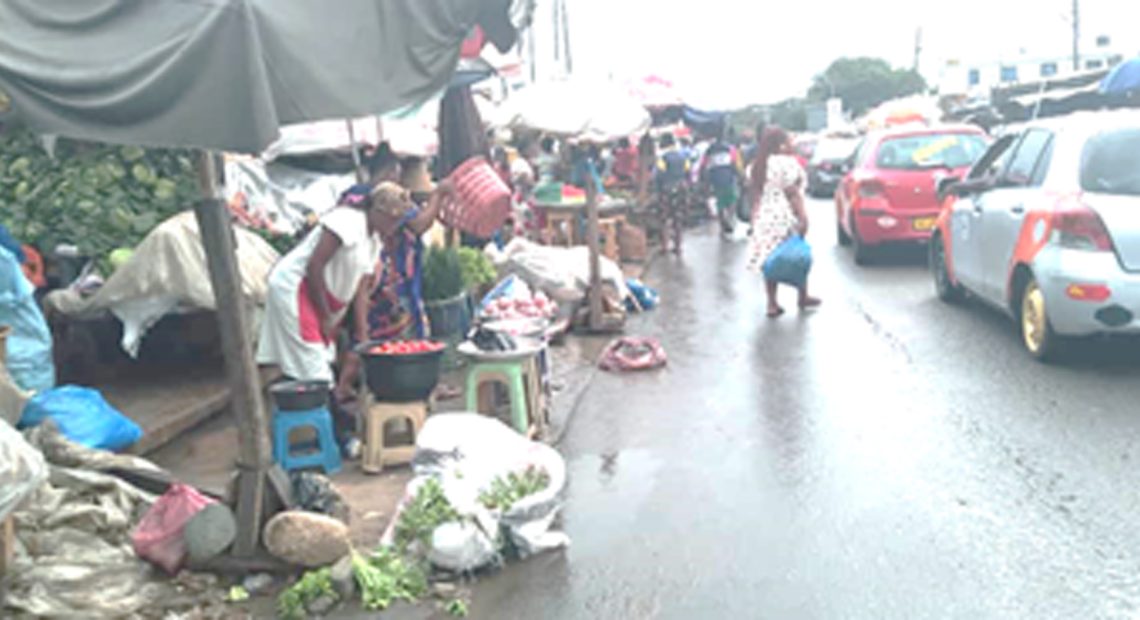Tema Community 1 Pedestrian Walkway Turns ‘New Market’ For Traders

By Eva Boamah (Ghana Institute Of Journalism)
It is becoming a common practice of some traders in the cities in Ghana to use pavements which are meant for pedestrians for their trading activities, and Tema, the ‘model city’ of Ghana’s first president, Dr. Kwame Nkrumah, is gradually losing its shine to this canker.
Selling on pavements has become a common practice at Tema Community One.
The activities of these hawkers generate a lot of fifth, cause human traffic, chokes the drains and create vehicular congestion.
The market is filled with activity and colour, as the women spread their goods – a vast array of fruits, vegetables and other items -out on the pavements.
The women are friendly and welcoming, and are eager to provide customers with a good deal. The market is vibrant and alive, with women engaging in lively conversations about the day’s events.
The market is a great place to find fresh produce, spices and other goods. The atmosphere is relaxed and laid-back, and the women are known for their warm hospitality. The market is a great place to find unique items and sample some of the local culture. It is an experience that should not be missed when visiting Tema.
The market women are fiercely independent and entrepreneurial, and it is common to see them haggling with customers over prices of their goods. As such, they are a symbol of the resilience of the local economy and the strength of the local people. The market women of the Tema Community One are integral to the local culture and economy, and they are an important part of the city’s identity. It is a reminder of the city’s long-standing tradition of providing an accessible marketplace for its citizens. They are a source of pride to the area’s inhabitants and a reminder of the importance of self-sufficiency.
While this practice provides a means of livelihood for people who would otherwise be unemployed, it also poses numerous challenges which the traders don’t seem to care about. It obstructs pedestrian movement and often causes congestion on the streets. The presence of these traders on pavements also creates a safety hazard for both the traders and pedestrians alike, as they often have to contend with motor vehicles and motorcycles racing along the streets. The sanitary condition of the pavements in the marketplaces is often poor and unhealthy, which poses a health risk for both the traders and the consumers. Garbage and waste are often left uncollected, and this creates an unsanitary environment with the potential for the spread of disease.
In an interview, some traders told this writer they trading on the pavements and the roads is due to lack of market space and also the availability of customers, as the majority of Ghanaians prefer to buy from the road side rather than the established markets. Some of these vendors on the pavements and roads said they make much profit selling by the roadside, compared to the established markets. A waakye seller, Alhjia Mariam, said she sells her food early in the morning to those going to work along the roadside. Another plantain seller occupies the pavement and when told that it was illegal, she replied that she usually pays money to the authorities of the Tema Municipal Assembly (TMA). A phone seller, Baah, said he is selling on the pavement because there is no space there.
Despite these challenges, the practice of traders selling on pavements and roads persists, because it provides an easy option for many consumers who cannot afford to buy goods from established markets, like the malls and ShopRite. However, there is a need for government intervention to regulate and manage this informal trading sector for the safety and well-being of both the traders and the public.
Source: Anchorghana.com




